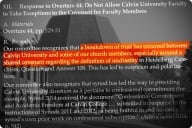You have /5 articles left.
Sign up for a free account or log in.
Many advocates for gay and transgender students were surprised and angered when they learned that U.S. Education Department had granted George Fox University an exemption from parts of Title IX of the Education Amendments of 1972. The exemption will permit George Fox to deny a transgender student the right to live in male student housing. George Fox said, and the Education Department accepted, that its Quaker religious beliefs would be violated by being forced to let the transgender student live in a way that affirms his gender identity.
This is not the first time George Fox has sought and received exemptions from Title IX. And the previous exemption (no longer in place) suggests that policies that the university once said were based on Scripture and could not be changed could in fact be changed.
In 1985, the Education Department said that because of its religious views, George Fox could -- in what would otherwise have been a violation of Title IX -- decline to enroll or hire divorced individuals or the parents of out-of-wedlock children. Details are not available on Education Department deliberations in the case, but it apparently took years for the department to make a decision; George Fox requested the exemption in 1976.
At that time, then-president David C. Le Shana wrote the Education Department saying that the university needed these exemptions. "Scripture teaches that a person is to be married to one partner for life, barring certain circumstances," he wrote. Employing or enrolling some divorced people would "jeopardize the Biblical stance" of the university. For example, he said that the college could not permit someone to enroll or work there if someone had been involved in "all kinds of extramarital immoral sexual activity while married." Based on that argument, and uncontested information that George Fox is in fact a religious college, the Education Department granted the exemption.
On unwed parenthood, Le Shana said that George Fox was concerned only with "out-of-wedlock pregnancy," not single parents who were married when their children were conceived, and who lost a spouse. Le Shana said that admitting those involved with non-married pregnancies "would be to run counter to the college's position with regard to sexual morality, which position is based on a religious/Biblical tenet."
Le Shana specified that there was no sex discrimination involved because George Fox's views on unwed parenthood and divorce applied to men and women.
A spokesman for George Fox said that the policies have not been in place for decades, and he declined to comment on the significance of the university changing policies it once requested federal waivers to keep.
He noted that the university's current policy about students who become pregnant states: "The university is committed to responding in a redemptive manner, seeking to balance compassion with accountability. Students can expect to be treated with Christian love as they deal with their new circumstances. Every effort will be made to ensure confidentiality, but the life and health of the mother and child and the spiritual well-being of the parents are our primary concerns. While some students in these circumstances may choose to leave the university temporarily, it is our hope that any student who chooses to continue in classes during pregnancy will find George Fox to be a supportive and redemptive community during this crucial time."
Paul Southwick, a lawyer representing the transgender student at George Fox (who goes by the name Jayce), said via email that the earlier changes in policy show that the university need not appeal for an exemption to Title IX, but could come up with ways to adjust policies and help a student thrive.
“Religious denominations and educational institutions constantly evaluate their beliefs and policies to determine whether they have been shaped by misunderstanding, prejudice or human error. At George Fox, issues surrounding pregnancy and divorce appear to have been reevaluated in light of the end of the religious exemptions originally granted in 1985 by the Department of Education with respect to unwed mothers and divorced individuals," Southwick said. "The point is, theology and policy are constantly evolving to reflect new understandings of race, gender, sexual orientation and gender identity and to respond to the human condition with increased compassion. Here, George Fox and the Northwest Yearly Meeting of Friends do not even appear to have any policies or theological positions prohibiting a student from transitioning or expressing a transgender identity. Now is not the time to create a new policy of intolerance. Rather, it is time to respond with compassion and an open mind. Jayce, like every other child of God, deserves that.”
Shane Windmeyer, executive director of Campus Pride, said via email that "there seems to be a disturbing track record at George Fox University since 1985 using 'religion-based' bigotry as a way to bar students and openly discriminate with Title IX exemptions." He added: "Today such discrimination toward unwed parents and divorced couples would never be tolerated at a credible institution of higher learning. As a result, George Fox's philosophy changed and evolved. Now is the time for George Fox to evolve once again."








